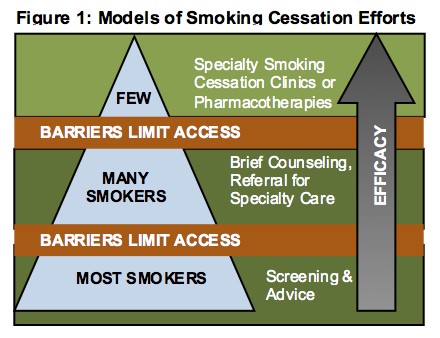
Can smokers with a history of depression respond better to smoking cessation interventions that are combined with mood-management? Many think so, including Dr. Jennifer Gierisch, Prinicpal Investigator of the Quit Smoking Tele-Health study.
“The potential benefit of decreasing tobacco use among users with depression could be tremendous,” says Gierisch.
Among VA patients with depression who are seen through primary care, nearly 40% are current smokers. Proactive telephone-delivered care that couples multiple sessions of behavioral counseling with pharmacotherapy is the optimal way to provide more intensive and effective treatment to people who smoke, yet the reach of this approach to populations with mental illness has been limited. Thus, there is a need to develop novel, proactive approaches that can broadly deliver intensive smoking cessation interventions to populations who may require additional help, such as those with depression.
______________________________________________
Here is the project summary:
Project Name: Adjunctive Mood Management for Telephone-Based Smoking Cessation in Primary Care
Project Acronym or Short Title: Quit Smoking Tele-Health (QST)
Funding Agency: VA Health Services Research
PI: Jennifer M. Gierisch, PhD, MPH
Co-Investigators: Lori Bastian, Hayden Bosworth, Patrick Calhoun, John W. Williams, Jr., Laura J. Fish, Maren Olsen, Shelby Reed
Project Staff: Jennifer Chapman (Project Coordinator), Margaret Falkovic and Karen Juntilla (Quit Coaches), Teresa Howard (Research Assistant), Amy Jeffreys, Theodore Berkowitz, and Yangong Li (Biostatisticians), Jenny Legge (Clinical Pharmacist), Avi Alkon and Lesa Powell (Programmers)
Operational Partners: Kim Hamlett-Berry (VA Office of Smoking and Health) and Peg Dundon (VA National Center for Health Promotion and Disease Prevention)
Brief Description: The Quit Smoking Telehealth Trial is a comparative effectiveness study with a two-group design in which 350 Veteran smokers with depression and chronic medical illness are randomized to either: 1) smoking cessation plus adjunctive behavioral mood management (SMK-MM group), an intervention that includes a proactive tele-health intervention that combines evidence-based smoking cessation counseling augmented with behavioral mood management and a tele-medicine clinic for accessing nicotine replacement therapy (NRT), or 2) smoking cessation telephone counseling control (SMK CONTROL), a contact-equivalent control that provides the same smoking cessation telephone counseling intervention augmented with health education (instead of mood management) and a tele-medicine clinic for accessing NRT. The goal of QST is to combine the potency of co-delivered mood management and the reach of proactive telephone-delivered interventions by testing the telephone delivery of behavioral mood-management for smoking cessation among smokers with current depression and chronic medical illness. Participants are surveyed at 6-month and 12-month post-randomization. The primary outcome is self-reported prolonged abstinence at the 6-month follow-up.
We are currently recruiting Veterans from the Durham VAMC, and all associated outpatient clinics. We currently have 100 participants randomized to the study and anticipate completing enrollment by January 31st, 2018.
Quit Smoking Tele-Health Intervention:
Nicotine Replacement Therapy Tele-medicine Clinic (Both groups):
In both arms, participants will be offered combination NRT consisting of the nicotine patch and and up to two NRT rescue methods (e.g., nicotine lozenge, inhaler)
Telephone Counseling
Both groups will receive 10 sessions of telephone counseling and a participant manual. Counseling session will be completed over about 5 months on an approximately twice a month schedule tailored to the individual patient’s needs.
Smoking cessation counseling (Both Groups):
Both groups will receive smoking cessation telephone counseling and smoking cessation content will be delivered at parallel times. The counseling intervention is based on standard techniques that have been shown to be efficacious for smoking cessation, and is informed by behavioral treatment principles, Social Cognitive Theory,23 and Motivational Interviewing. The counseling intervention and participant workbook were adapted from our previous successful telephone counseling intervention that targeted chronically ill Veterans. The treatment protocol is consistent with the Public Health Service Clinical Practice Guide and was tailored to the Veteran population based on principles of evidence and consensus-based clinical practices, and our own experience conducting telephone counseling.
Mood Management Group (SMK-MM):
In the SMK-MM enhanced arm, behavioral mood management is integrated into the evidence-based smoking cessation counseling. The mood-management sessions are informed by Cognitive Behavior Therapy (CBT) and emphasize psycho-educational and skills-based approaches to CBT. CBT has been used extensively to address mood management. Specifically, SMK-MM enhancement includes behavioral activation, cognitive restructuring (working with automatic thoughts, problem solving, and behavioral skills (i.e., activity scheduling, relaxation training/controlled breathing).
Health education control condition (SMK Control):
In the contact-equivalent health education condition, participants will receive parallel smoking cessation content on the same schedule as in the MM-enhanced arm; however, health education content will supplant the MM content. The educational content is based on the VA National Center on Health Promotion and Disease Prevention’s “Health Living Messages” on such topics as being safe, eating wisely, getting recommended immunization and screening tests, and being involved with your health care. Participants also will receive chronic-disease-specific self-management information.

____________________________________________________________________________________
DGIM: We want to hear about your recent research projects! Write to GIM Communications Strategist, Clare Il’Giovine.